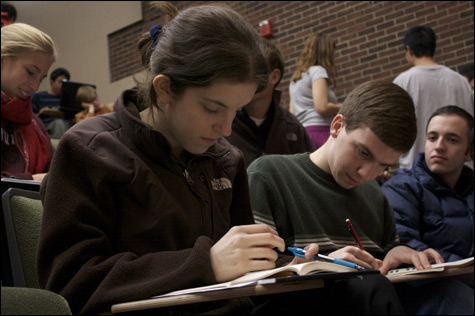
CRIMSON COMEBACK: After several less-than-stellar years, the Harvard Quiz Bowl team is back among the best in America. Above (from left to right), Meryl Federman, Adam Hallowell, and Mike Yashinsky await seedings for the playoff rounds at the Early Fall Tournament. |
Andrew Watkins is having faulty-buzzer issues. He's seated at the front of a wood-paneled classroom in Harvard's Sever Hall trying to ask six eager quiz-bowl competitors questions about the US presidential election of 1904 — you know, the one when Theodore Roosevelt defeated Alton Brooks Parker. Each player grips a big red "I know that!" button, but the buzzer keeps sounding when nobody's pressing, interrupting the interrogation and breaking everybody's concentration. Watkins curses the set-up each time this happens, but despite the distractions, competition runs high during this 20-minute round of a day-long college quiz bowl tournament that Harvard hosted in early December.
The usual format for quiz-bowl tournaments involves two or more teams of up to four players, each competing in early rounds that define multiple play-off brackets for later in the day. During each round, a moderator reads 20 "toss-up" questions (in his or her best game-hosty voice), which can be answered by any player who buzzes in first. If the player answers a toss-up incorrectly, his or her team loses five points — this is called "negging" (as in "negative scoring"). If the player answers correctly, his or her team receives 10 points and has the opportunity to work together to answer three 10-point bonus questions — usually related to the same subject.

The American quiz-bowl phenomenon emerged in the late 1950s with the General Electric College Bowl, an annual tournament played in nationally televised weekly rounds. But it wasn't until the 1980s that colleges began to host their own tournaments. In 1996, former players and coaches founded National Academic Quiz Tournaments (NAQT), which now oversees quiz-bowl activity nationally. The well-known College Bowl suspended its contest activities in 2008. Quiz-bowl community activity now centers on the yearly NAQT tournament, which takes place each spring, and on tournaments hosted year-round by schools across the country. Schools can host and compete in as many or as few tournaments as they like, which makes "league statistics" something of a jumble. Determining the top quiz-bowl schools is a near impossibility.
Crimson rules!
Watkins, a tall, blond sophomore who speaks quickly and favors shot-glass-sized bottles of over-the-counter drug-store supplements like 7-Hour Energy Shot Fuel, is president of Harvard's 25-student Quiz Bowl team, which is in the process of recovering its reputation as an academic-quiz powerhouse.
In both 1998 and 2003, Harvard won the NAQT Intercollegiate Championship. The university had ranked within the top 15 quiz-bowl schools since the glorified intercollegiate trivia contests became popular in the early 1990s. But club activity (and victories) waned — by Harvard standards, at least — after '03, so students launched an effort to rebuild their program.
The team stepped up Harvard's involvement in the national quiz-bowl scene by hosting and entering more tournaments, and began practicing "officially" two nights a week (though unofficially, some team members practice five nights a week) in a small room on the third floor of Memorial Hall. This past year, they won the NAQT tournament again.
"Pretty much every tournament is at its own discretion as to the level of statistics it keeps," says NAQT president and chief technical officer R. Robert Hentzel on the phone from Bloomington, Minnesota. "Some will just record who won, and some will record specific toss-ups." However, he says, "NAQT tends to have good statistics for its tournaments" — and by those standards — "Harvard is the reigning champion."
"The Harvard team is on an upswing in general," says sophomore Meryl Federman, in an e-mail. "Kyle Haddad-Fonda, our ex-president, essentially revived the team after many years of inactivity, so we've started accumulating some great talent in the past few years."
Senior Haddad-Fonda is still an active member of the team, though no longer it's leader. (He got word in November that he'll be one of 32 US students studying as Rhodes Scholars at Oxford next year.) The previous president, according to Watkins, "was a good player, but a terrible leader." Haddad-Fonda began the push and, Watkins notes, the team added several strong players in the past two years.
Know it alls
During lunch break at Harvard's December tournament, those players could be found at the back of a small auditorium on the first floor of Sever, scarfing slices of pepperoni pizza and swapping stories about auditioning for Jeopardy! "I auditioned for college Jeopardy!," says Julia Schlozman, a senior with cropped curls, who was wearing a black peacoat as protection against Sever Hall's drafty classrooms. "I'll hear back in March."
"You have to try out for Jeopardy! so many times," says Federman, whose long brown hair and fair skin make her somewhat resemble a Renaissance painting. She won $75,000 in 2007 when she was champion of the Jeopardy! Summer Games Teen Tournament.
Surprisingly, though, Federman says quiz bowl is more difficult than the popular TV-quiz show.